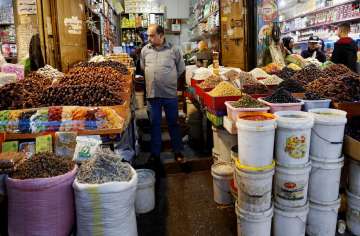Coronavirus warnings for Ramadan as some pandemic shutdowns ease
With traditional, communal meals for the poor, large fast-breaking dinners with family and friends and cultural events after sunset canceled, the world's 1.8 billion Muslims find themselves cut off from much of what makes the month special.

BANGKOK (AP) — The world inched toward a new phase in the coronavirus crisis on Thursday, as some countries like Vietnam and New Zealand with few new cases moved toward ending their shutdowns while others like Singapore and Japan were tightening measures to prevent a surge in infections.
Like the U.S., many countries are moving from crisis mode to figuring out how to live with the virus by modifying pre-pandemic routines with precautions, more testing and containment of flare-ups, mindful of the potential for future waves of the virus.
Authorities in the capital of Indonesia, the world’s most populous Muslim majority nation, extended to May 22 strict disease-fighting restrictions with the approach of Ramadan, which begins with the new moon this week.
With traditional, communal meals for the poor, large fast-breaking dinners with family and friends and cultural events after sunset canceled, the world's 1.8 billion Muslims find themselves cut off from much of what makes the month special.
Pakistan Prime Minister Imran Khan bowed to the country’s religious clerics, refusing to close mosques despite an appeal from the Pakistan Medical Association warning such gatherings are like a petri dish for the spread of the virus in a country that has a fragile health care system.
U.N. Secretary-General Antonio Guterres urged Muslims to “focus on our common enemy — the virus," and repeated an earlier appeal for an immediate cease-fire for all conflicts. In a separate message, he urged countries to provide equitable help to all, saying the pandemic was “a human crisis that is fast becoming a human rights crisis.”
Some leaders are using the crisis as a pretext for repressive measures, Guterres said. “The message is clear: People — and their rights — must be front and center,” he said.
The United Nations has warned that tens of millions of people risk starvation as the coronavirus pandemic, a plague of locusts in Africa and other disruptions prevent food from reaching the world's most vulnerable populations in places like Yemen and South Sudan.
A report released Wednesday estimated that at least 135 million people are at acute risk of starvation due to conflicts and other factors. The report was compiled before shutdowns, border closures and freezes on transport activities began disrupting food supplies.
In response, the EU pledged 20 billion euros ($22 billion) for helping bridge such disruptions to provide help to vulnerable communities globally.
While some parts of the world are just beginning to grapple with the pandemic, in China authorities reported no new deaths and just 10 new cases on Thursday. The number of people hospitalized dropped to 959, with 63 considered serious cases.
China has reopened many businesses. Middle and high school seniors preparing for exams are returning to classes. But a ban on foreign arrivals and strict quarantine measures remain in place to prevent an influx of new cases from abroad or fresh infections among those thought to have recovered or who had no symptoms but could still be spreading the virus.
Neighboring Vietnam, which moved quickly to close its borders and trace coronavirus cases, has reported no new cases in the past three days and is preparing to loosen restrictions.
“I feel blessed that we can feel safe and life is getting back to normal. I’m proud of the country," Nguyen Thi Thuy said after reopening her coffee shop for the first time in nearly a month.
One of her first customers, Nguyen Ngoc Tri, said the lockdown was “frustrating." But he added, “everyone has to sacrifice and do their part for the safety of the community."
New Zealand, which announced just three new cases of the coronavirus on Thursday, remained on strict lockdown, with 1,451 confirmed cases and 16 deaths, but was preparing to ease limits next week.
But the virus continues to pop up unexpectedly.
Singapore has been reporting hundreds of new cases daily, exceeding 10,000 in total, with the vast majority of new infections traced to crowded migrant worker dormitories.
Japanese officials said more crew members on a cruise ship docked in Nagasaki have tested positive, raising the total on board to 48. The Italian-operated Costa Atlantica has been docked since late January for repairs and maintenance and has no passengers. Officials planned to test all the remaining crew by Friday. They also are investigating how the virus got on board since the crew has stayed on the ship since mid-March.
The coronavirus has infected more than 2.6 million people and killed about 183,000, including more than 45,000 in the United States, according to a tally compiled by John Hopkins University from official government figures.
The true numbers are undoubtedly far higher, since testing is limited and counting methods vary. Most people infected suffer from only mild or moderate symptoms and survive.
But the crushing death toll has left many people cautious and they may need weeks, or even months, to regain confidence and resume normal activities. Future waves of outbreaks could reverse any gains in the interim, Dr. Robert Blendon, a Harvard professor of health policy and political analysis, said.
As President Donald Trump shifts to what White House officials call a new chapter in the response, officials face a challenge in reassuring the public while ensuring enough precautions are taken as communities emerge from shutdowns to prevent fresh onslaughts of cases.
“People will watch the cases and listen to the major public health leaders, and if there's a conflict, that will slow things even greater," Blendon said.
___
Lederer reported from New York. Associated Press reporters from around the world contributed.